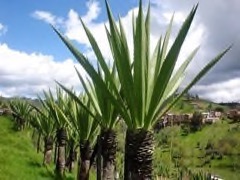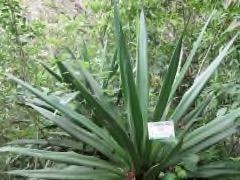 |
|
Wikimedia.org |
 |
| Rodrigo.Argenton on Wikimedia.org |
Translate this page:
Summary
Physical Characteristics

 Furcraea andina is a PERENNIAL growing to 2.5 m (8ft) by 1.5 m (5ft) at a fast rate.
Furcraea andina is a PERENNIAL growing to 2.5 m (8ft) by 1.5 m (5ft) at a fast rate.
See above for USDA hardiness. It is hardy to UK zone 10.
Suitable for: light (sandy) and medium (loamy) soils, prefers well-drained soil and can grow in nutritionally poor soil. Suitable pH: mildly acid and neutral soils and can grow in very acid soils.
It cannot grow in the shade. It prefers dry or moist soil and can tolerate drought.
UK Hardiness Map
US Hardiness Map
Synonyms
Furcraea delevantii Riviere
Plant Habitats
Edible Uses
Edible Parts: Flowers Leaves
Edible Uses:
Edible Portion: Bud, Leaves - alcoholic drink. The young buds are edible. They are pickled. The leaves are used to make a fermented drink.
References More on Edible Uses
Medicinal Uses
Plants For A Future can not take any responsibility for any adverse effects from the use of plants. Always seek advice from a professional before using a plant medicinally.
The leaves have been used in topic preparations for treatment of boils. The extract of leaves is used against horse lice.
References More on Medicinal Uses
The Bookshop: Edible Plant Books
Our Latest books on Perennial Plants For Food Forests and Permaculture Gardens in paperback or digital formats.

Edible Tropical Plants
Food Forest Plants for Hotter Conditions: 250+ Plants For Tropical Food Forests & Permaculture Gardens.
More

Edible Temperate Plants
Plants for Your Food Forest: 500 Plants for Temperate Food Forests & Permaculture Gardens.
More

More Books
PFAF have eight books available in paperback and digital formats. Browse the shop for more information.
Shop Now
Other Uses
Packing (sacks and packages for agriculture). Ropes, Tapestry (rugs and tapestry). The fibres can be stained with different organic materials, such as avocado seed, achiote and eucalyptus cortex. Handcrafts, purses, bags, handbags, mattresses, curtains, shoes, umbrellas, baskets and many other products. Subproducts: Pulp for organic fertilizer and paper. Leaves juice used for soap, fungicides, alcoholic beverages (homemade tapetusa), organic fuel and animal food. Floral stem used in the construction of houses and ladders. Carbon Farming Solutions - Industrial Crop: fiber. Good leaf lamina fibres that need to be seperated from the rest of the plant. Lamina fibres cannot be used for fine textiles but for rope, nets, bags, and rugs. (Industrial crops are grown for non-food uses. Industrial crops provide resources in three main categories: materials, chemicals, and energy. Traditional materials include lumber and thatch, paper and cardboard, and textiles) [1-1]. Agroforestry Services: living fence (Agroforestry is a land use management system in which trees or shrubs are grown around or among crops or pastureland).
Special Uses
Carbon Farming
References More on Other Uses
Cultivation details
Industrial Crop: Fiber Management: Standard Regional Crop
Climate: tropical highlands. Humidity: semi-arid to humid. A xerophytic monocot. A perennial succulent with basal rosettes of sword-shaped, fleshy, toothed leaves. Frost tender, min. 6C, 43F). Requires a sunny position and well-drained soil. Tolerant to arid conditions and soils poor in nutrients, but it requires semi-humid conditions, warm temperature and exposure to sunlight for good development. Prefered pH 5.1–5.4. Carbon Farming Solutions - Cultivation: regional crop. Management: standard (Describes the non-destructive management systems that are used in cultivation) [1-1].
Carbon Farming
-
Industrial Crop: Fiber
Clothing, rugs, sheets, blankets etc. Currently, almost none of our fiber are produced from perennial crops but could be!
-
Management: Standard
Plants grow to their standard height. Harvest fruit, seeds, or other products. Non-Destructive management systems.
-
Regional Crop
These crops have been domesticated and cultivated regionally but have not been adopted elsewhere and are typically not traded globally, Examples in this broad category include perennial cottons and many nuts and staple fruits.
References Carbon Farming Information and Carbon Sequestration Information
Temperature Converter
Type a value in the Celsius field to convert the value to Fahrenheit:
Fahrenheit:
The PFAF Bookshop
Plants For A Future have a number of books available in paperback and digital form. Book titles include Edible Plants, Edible Perennials, Edible Trees,Edible Shrubs, Woodland Gardening, and Temperate Food Forest Plants. Our new book is Food Forest Plants For Hotter Conditions (Tropical and Sub-Tropical).
Shop Now
Plant Propagation
Seeds. Bulblets, Cuttings. Best method by bulbils found on lower stems.
Other Names
If available other names are mentioned here
Cabui, Cabuya, Chuchao, Coquiza, Maguey, Penca, Penco, Pita, Fique
Native Range
SOUTHERN AMERICA: Ecuador, Peru
Weed Potential
Right plant wrong place. We are currently updating this section.
Please note that a plant may be invasive in one area but may not in your area so it's worth checking.
None Known
Conservation Status
IUCN Red List of Threatened Plants Status : This taxon has not yet been assessed

Growth: S = slow M = medium F = fast. Soil: L = light (sandy) M = medium H = heavy (clay). pH: A = acid N = neutral B = basic (alkaline). Shade: F = full shade S = semi-shade N = no shade. Moisture: D = dry M = Moist We = wet Wa = water.
Now available:
Food Forest Plants for Mediterranean Conditions
350+ Perennial Plants For Mediterranean and Drier Food Forests and Permaculture Gardens.
[Paperback and eBook]
This is the third in Plants For A Future's series of plant guides for food forests tailored to
specific climate zones. Following volumes on temperate and tropical ecosystems, this book focuses
on species suited to Mediterranean conditions—regions with hot, dry summers and cool, wet winters,
often facing the added challenge of climate change.
Read More
Expert comment
Author
Trel.
Botanical References
Links / References
For a list of references used on this page please go here
Readers comment
| Add a comment |
|
If you have important information about this plant that may help other users please add a comment or link below. Only comments or links that are felt to be directly relevant to a plant will be included. If you think a comment/link or information contained on this page is inaccurate or misleading we would welcome your feedback at [email protected]. If you have questions about a plant please use the Forum on this website as we do not have the resources to answer questions ourselves.
* Please note: the comments by website users are not necessarily those held by PFAF and may give misleading or inaccurate information.
To leave a comment please Register or login here All comments need to be approved so will not appear immediately.
|
Subject : Furcraea andina
|
|
|
|